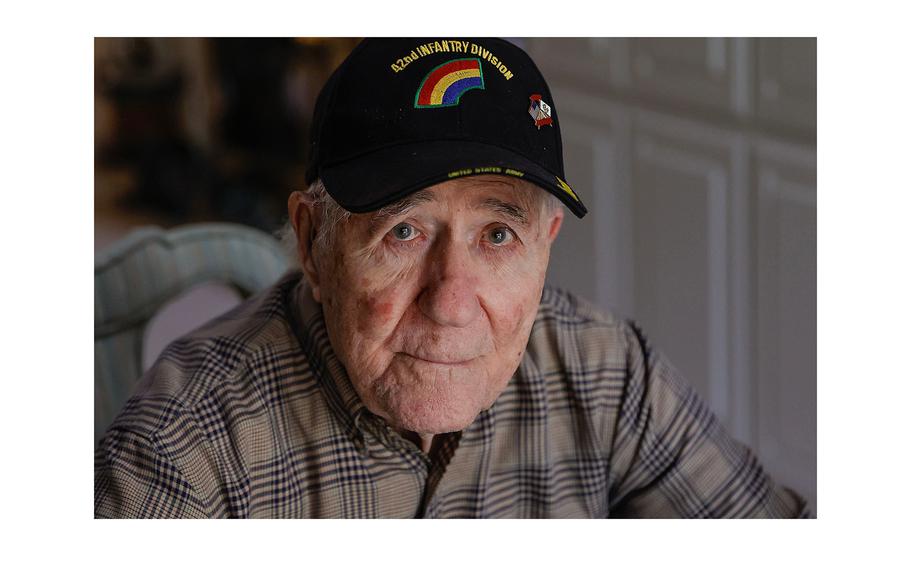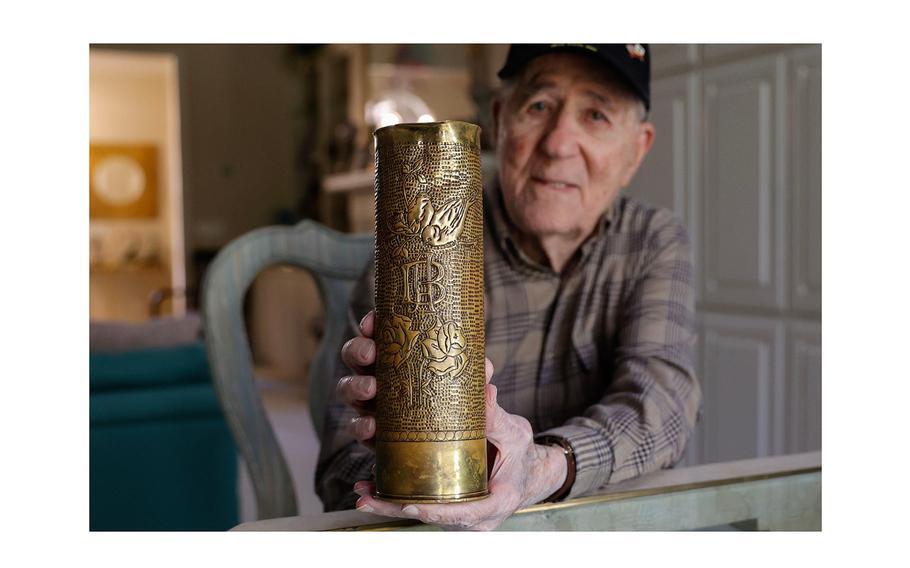
World War II veteran and liberator Hilbert “Hibby” Margol is seen at his home in Dunwoody, Ga., on Wednesday, Jan. 17, 2024. (Natrice Miller/AJC/TNS)
(Tribune News Service) — Courage and conviction is the theme of a virtual Holocaust remembrance event Sunday. Speakers for the event represent both of those traits.
In this time of wars and racial, religious and cultural strife across the globe, Elly Gotz, a 95-year-old Holocaust survivor, says hate is not the answer.
Gotz weighed 70 pounds when he left Dachau concentration camp in Germany at age 17 and spent six months recovering in the hospital. Now living in Canada, he recalls feeling “full of hate” when released from the hospital and wanted revenge for what he and his family experienced.
“I was looking for a gun so I could kill Germans,” said Gotz, who is now a Holocaust educator. “Fortunately, I never found a gun. One day I said to myself: ‘You are crazy … stop hating.’ And I tell you, when I gave up hate, I started living for the first time.”
Gotz is a guest speaker in a virtual Am Yisrael Chai Atlanta event Sunday honoring International Holocaust Remembrance Day. The online event takes place from 7-8:30 p.m. The official date that memorializes victims of the Holocaust is Jan. 27.
Am Yisrael Chai Atlanta commemorates Holocaust Remembrance Day with a different theme each year. This year’s focus is “Courage and Conviction — The Holocaust in Lithuania.” To sign-up to attend the virtual event visit givesignup.org/TicketEvent/RemembranceEvent.
An Am Yisrael Chai Atlanta statement said that the Holocaust in Lithuania resulted in an almost complete annihilation of the Jewish community.
“More than 95% of Lithuania’s Jewish population — approximately 200,000 Jews — were murdered by the Nazis and their Lithuanian collaborators during the war,” the statement said.
Sunday’s event includes a screening of director Michael Kretzmer’s 2022 documentary on the massacre titled, “J’accuse!” and an online exhibit of the Holocaust in Lithuania.
Author Silvia Foti and activist Grant Gochin are featured in the “J’accuse!” film, and they are speakers in the commemoration event along with Gotz.
Gochin is living in California and a native of South Africa. He has filed nearly 30 lawsuits against the Lithuanian government over the past decade accusing the country of Holocaust revisionism.
Foti was a 2023 Nobel Peace Prize nominee and is author of the memoir “Storm in the Land of the Rain: A Mother’s Dying Wish Becomes Her Daughter’s Nightmare.” Foti is a devout Catholic from Chicago and shares her discovery and yearslong work to prove that her grandfather, who was considered a war hero in Lithuania, was actually the opposite. He aided Nazi Germany and was complicit in the murder of Lithuanian Jews, she writes.
“He was like the governor of a region, “ Foti said. “He signed several documents, and one of the documents called for the rounding up of all the Jews in Šiauliai ... Over 2,000 Jews were rounded up of all ages, babies to grandparents. Within six weeks they were all murdered. I just burst into tears when I discovered that.”
Foti has partnered with Gochin, who is Jewish, in a quest to get Lithuania to acknowledge its role in the Holocaust.
“If they can do that then there can be true reconciliation with Israel and with the Jews,” Foti said.
More than 100 of Gochin’s family members died during the Holocaust, he said.
“I was doing it because I want the truth about who murdered my own family,” Gochin said of his legal cases against Lithuania. “They say things such as, I wasn’t murdered so I don’t have standing to sue them. That’s how they threw out one set of cases.”
Torture of the Holocaust in Lithuania
For Gotz, he and his parents, an aunt and three uncles were in an occupied ghetto before they were sent to concentration camps. Gotz said there were 30,000 Jews in the ghetto when they entered in 1941 and only 6,000 were still alive in 1943. Half of those remaining were killed when Germans set the ghetto on fire, he said. Gotz’s family fled the ghetto beforehand but they were captured and sent to concentration camps, he added.
Gotz was sent to Dachau concentration camp, which was liberated by the U.S. Army on April 29, 1945.

World War II veteran and liberator Hilbert “Hibby” Margol on Wednesday, Jan. 17, 2024, holds a 75 mm howitzer shell casing that he found during the war. (Natrice Miller/AJC/TNS)
Hilbert Margol of Dunwoody was one of the military liberators serving in the U.S. Army at Dachau on that day, and turns 100-years-old in February.
In recent years, Margol has met Gotz virtually and other survivors in-person, who were imprisoned at the camp.
But on that April day in 1945, Margol didn’t come upon the living when arriving at Dachau, he said. Soldiering with his twin brother, the two came upon stacks of deceased bodies outside and inside railroad boxcars.
“We didn’t understand what we were seeing,” Margol said. “Well after the war, we learned that the crematorium was located next door and they couldn’t operate the oven and that was why all these bodies were around.”
Margol, who is Jewish and speaks during Am Yisrael Chai Atlanta’s virtual exhibit presentation, told The Atlanta Journal-Constitution that there are some people who want to deny the Holocaust.
But, he said, “I tell people, I witnessed the Holocaust.”
©2024 The Atlanta Journal-Constitution.
Visit at ajc.com
Distributed by Tribune Content Agency, LLC.